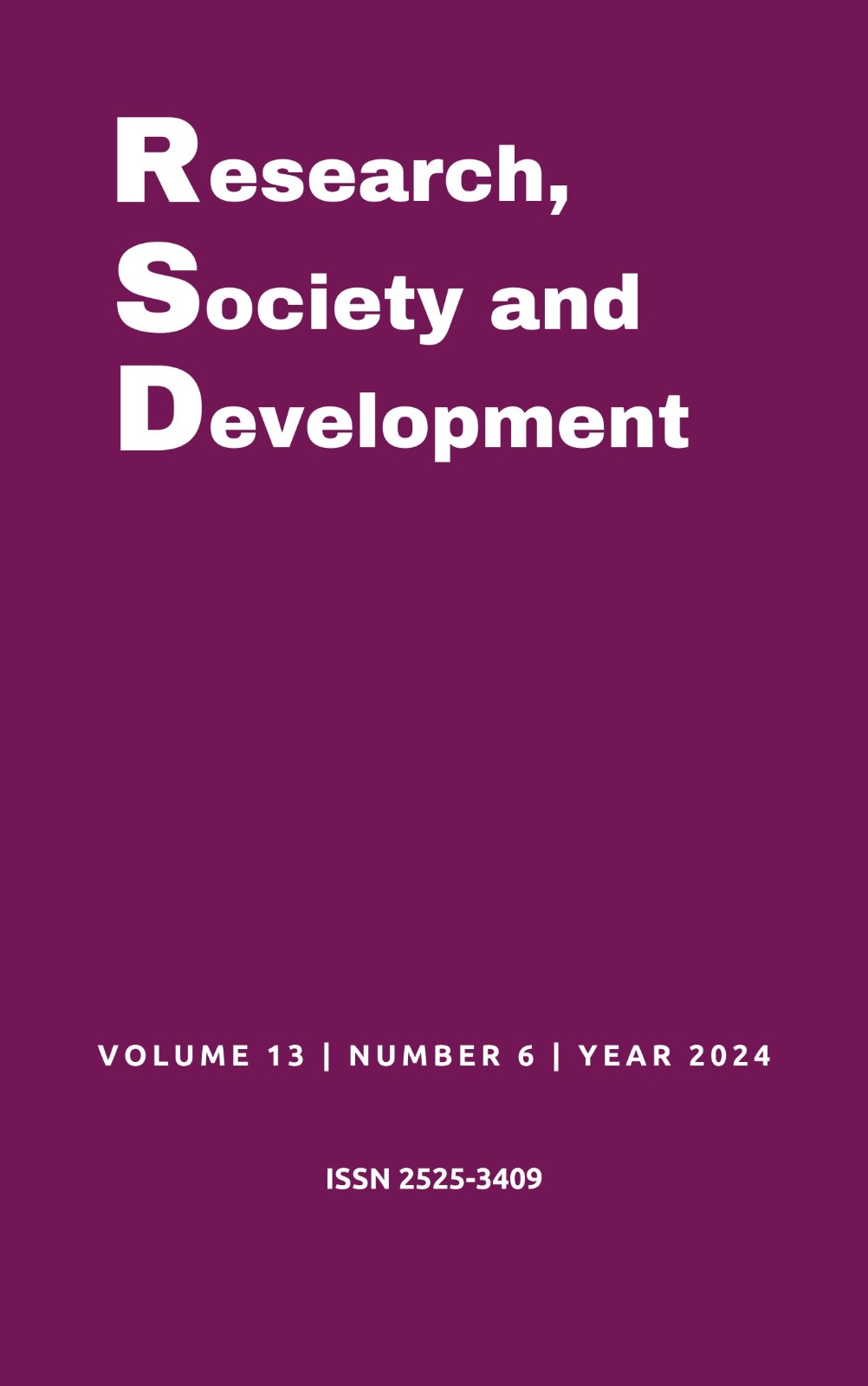Money versus Happiness: Observational study
DOI:
https://doi.org/10.33448/rsd-v13i6.45978Keywords:
Love, Financial support, Happiness, Mental health.Abstract
In recent years, several researchers have turned their attention to unraveling the relationships between money, happiness and mental health. Mental health is part of what sustains people's individual and collective abilities to make decisions, establish relationships and shape the world. The aim of this study was to address questions about money, happiness and mental health. The methodology applied was an observational and cross-sectional study with a quantitative approach. For the results obtained, it was questioned how relationships with parents and interpersonal relationships can affect the mental and spiritual development of the participants. It can be seen that taboos such as alcohol and smoking affect individuals less than betrayal or distrust within relationships. Factors such as happy marriages, volunteer work, religion and financial control contribute to the individual's better emotional and mental state. It is concluded that mental, emotional and financial success arises from mentally healthy people.
References
Andrade, F. L. (2011) Determinismo Biológico e Questões de Gênero no Contexto do Ensino de Biologia: Representações e Práticas de Docentes do Ensino Médio. Dissertação, Universidade Federal da Bahia, Universidade Estadual de Feira de Santana, Programa de Pós-Graduação em Ensino, Filosofia e História das Ciências.
Albuquerque, M. A. C. (2005). Sobre as Uniões Paralelas: Um Olhar Psicanalítico. Academia. https://www.academia.edu/33214312/Sobre_as_Uni%C3%B5es_Paralelas_Um_Olhar_Psicanal%C3%ADtico.
Araújo, A. M., Silva, A. F., Lucio, R. O., Pucci, S. H. M. (2022). Álcool vs Pandemia: Impactos no Relacionamento Familiar. Revista Ibero-Americana De Humanidades, Ciências E Educação, 8(6), 1021–1039. DOI: https://doi.org/10.51891/rease.v8i6.5995.
Brasil. (2013). ORGANIZAÇÃO PAN-AMERICANA DA SAÚDE. Financiamento Público de Saúde. https://bvsms.saude.gov.br/bvs/publicacoes/financiamento_publico_saude_eixo_1.pdf.
Costa, P. I. F. S. (2013). Promoção da Saúde Mental em Idosos, Projeto de Intervenção na Depressão com base na Animação Sociocultural. Mestrado em Educação para a Saúde, Escola Superior de Tecnologia da Saúde de Coimbra.
Costa, G. P. (2007). O Amor e seus Labirintos. Dados Eletrônicos, Porto Alegre, Artmed.
Ferraz, R. B., Tavares, H., & Zilberman, M. L. (2007) Felicidade: uma revisão. Archives of Clinical Psychiatry, 34(5), 234–242. https://doi.org/10.1590/S0101-60832007000500005
Firmino, C. E. (2018). Felicidade e religião em Freud: uma leitura crítica Estudos e Pesquisas em Psicologia, 18(2), 667-684 Universidade do Estado do Rio De Janeiro.
Formigoni, M. L. O. S., & Vieira, P. C. A. (2018). Efeitos de Substâncias Psicoativas. Universidade Federal de São Paulo (UNIFESP), Universidade Virtual do Estado de São Paulo (UNIVESP), Secretaria Nacional de Políticas sobre Drogas (SENAD).
Frenhan, M., & Silva, D. A. (2021) A felicidade na voz de estudantes universitários. Research, Society and Development, 10(2), e27610212505. https://doi.org/10.33448/rsd-v10i2.12505.
Galvão, A. M., Anes, E., & Pinheiro, M., J. G. M. (2019). A Felicidade: um dos determinantes da saúde ocupacional. In V Congresso Ibero-Americano e Luso-Brasileiro de Psicologia da Saúde/I Congresso Promoção da Saúde e do Bem-Estar no Ensino Superior. Algarve. p. 45-50. ISBN 978-989-8859-74-7.
Ghent A. (2011). The happiness effect. Bull World Health Organ. 89(4):246-7. 10.2471/BLT.11.020411.
Gusmão, G. (2019) Ter bons relacionamentos é o segredo para envelhecer bem, diz estudo Nem fama, nem fortuna: o segredo da velhice feliz é o amor. Revista Exame, Ciências.
Henkel, D., Meurer, H., & Senger, J. (2023). Palestra Vivendo Mais e Melhor. Grupo Mente Ativa, Evento Eletrônico.
Hernandez, J. A. E. (2005) Papéis Sexuais, Ajustamento Conjugal e Emocional na Transição para a Parentalidade. Tese, Curso de Pós-Graduação em Psicologia do Desenvolvimento.
Martins, A. (2016). O que realmente nos faz felizes? As lições de uma pesquisa de Harvard que há quase oito décadas tenta responder a essa pergunta. BCC Mundo.
Mineo L. (2017). Bons genes são bons, mas a alegria é melhor. The Harvard Gazette.
Patrício, K. P., Ribeiro, H., Hoshino, K., & Bocchi, S. C. M. (2008). O segredo da longevidade segundo as percepções dos próprios longevos. Ciência & Saúde Coletiva, 13(4):1189-1198.
Pereira, A. S., Shitsuka, D. M., Parreira, F. J., & Shitsuka, R. (2018). Metodologia da pesquisa científica. UFSM. https://repositorio.ufsm.br/bitstream/handle/1/15824/Lic_Computacao_Metodologia-Pesquisa-Cientifica.pdf?sequence=1
Pinto, J. M. R. (2014). Does Money bring happiness? The relationship between inputs and quality in education. Education Policy Analysis Archives, 22, 19. https://doi.org/10.14507/epaa.v22n19.2014.
Reis, E. A., & Reis I. A. (2002) Análise Descritiva de Dados. Relatório Técnico do Departamento de Estatística da UFMG. www.est.ufmg.br.
Silva, J. D. A., Comin, F. S., & Santos, M. A. (2016). Conjugalidade e casamentos de longa duração na literatura científica. Contextos Clínico vol.9 no.1 São Leopoldo.
Silva, M. (2022). O longo estudo que desvendou a felicidade. Gqportugal. https://www.gqportugal.pt/o-longo-estudo-que-desvendou-a-felicidade.
Vaillant, G. E. (2015) Triumphs of Experience: The Men of the Harvard Grant Study. Belknap Press, Reprint edição. p. 480.
Vieira, K. M., Flores, S. A. M., Kunkel, F. R., Campara, J. P., & Paraboni, A. L. (2014). Níveis de Materialismo e Endividamento: Uma Análise de Fatores Socioeconômicos na Mesorregião Central do Estado no Rio Grande Do Sul. Revista de Administração, Contabilidade e Economia da Fundace. DOI: https://doi.org/10.13059/racef.v5i2.68.
Waldinger, R. (2018). “A solidão mata. É tão forte quanto o vício em cigarros ou álcool.” 2018. Revista Fronteiras.
Downloads
Published
Issue
Section
License
Copyright (c) 2024 Wagner Rafael da Silva; Luan Souza do Nascimento; Rosylene Machado Pelegrini ; Milena Carla Queiroz da Silva; Thiago Gomes Figueira

This work is licensed under a Creative Commons Attribution 4.0 International License.
Authors who publish with this journal agree to the following terms:
1) Authors retain copyright and grant the journal right of first publication with the work simultaneously licensed under a Creative Commons Attribution License that allows others to share the work with an acknowledgement of the work's authorship and initial publication in this journal.
2) Authors are able to enter into separate, additional contractual arrangements for the non-exclusive distribution of the journal's published version of the work (e.g., post it to an institutional repository or publish it in a book), with an acknowledgement of its initial publication in this journal.
3) Authors are permitted and encouraged to post their work online (e.g., in institutional repositories or on their website) prior to and during the submission process, as it can lead to productive exchanges, as well as earlier and greater citation of published work.


